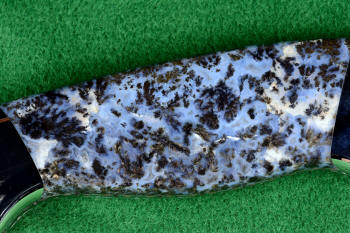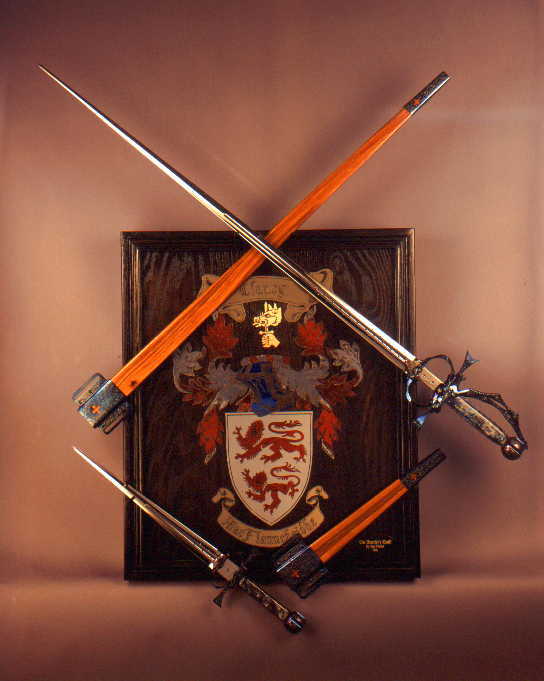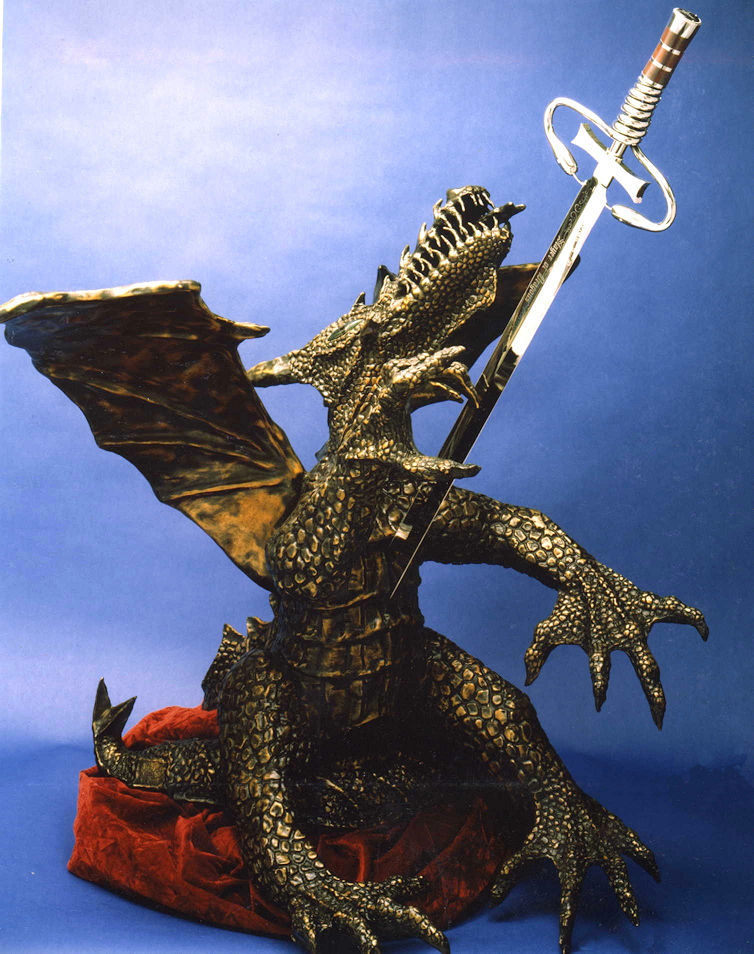Jay Fisher - Fine Custom Knives
New to the website? Start Here

"Zosma" Texas Moss Agate Gemstone Handle
Jay Fisher - Fine Custom Knives |
|||
New to the website? Start Here |
 "Zosma" Texas Moss Agate Gemstone Handle |
||
In an effort to educate, as a service to my knife community, I believe it's very important to identify, expose, and eradicate myth from my profession and tradecraft. Knives have been made longer than any tool of man, even predating homo sapiens, so there is an incredibly long history of the cutting edge. In that long and important history, it's only reasonable that myths, stories, and fanciful tales would be told. There's nothing wrong with myth and story, as long as it's clear that the myth is exactly that, and that people realize that it is entirely untrue.
Since not a lot of people believe in supernatural beings or events directly related to knives, the second definition is the one we are most concerned with, a widely held but false belief or idea. The key word here is "false." Simple enough; it's foolish in the age of knowledge and information to believe a false idea, concept, or tale, yet people do.
I heard it when I was a kid: a sword, so sharp, so lethal and impressive, that a silk scarf dropped on the blade would be cut in half, merely by the force of gravity, as it drifted over the cutting edge. In my child's mind, I could conceive of this. I had been cut a few times, was familiar with a sharp knife and the gasp when the edge sliced into my fingers. Plus, there were these things called straight razors and scalpels, so sharp as to lay open skin almost by the mere touch. So it wasn't too much of a stretch to believe that somewhere, somehow, a cutting edge was so sharp, so refined, so very keen that a piece of cloth could be severed by its own weight, while falling through the air and across a lethally sharp cutting edge.
Like most kids, I took this tale to school, where other kids had also heard it. It wasn't long before we agreed that a Japanese sword blade would be the instrument for this, for nothing was as amazing as a Samurai sword and nothing as lethal and keen. We got this idea from movies, from stories, and from tales by our fathers, uncles, and grandfathers who swore the Japanese swords were the sharpest things ever.
Their view originated in Word War Two, where many served, and where Japanese swords were brought home to the U.S. by the hundreds of thousands as Japan was disarmed after their defeat and surrender. People nowadays seldom mention the Big War, how Japan invaded Hawaii, how they intended to kill and defeat our military minding its own business in the Pacific. I won't get into the politics of past wars and aggression. I will honor those who served, including my Uncle who was a Marine in the 13th Regiment who fought valiantly and was wounded on Mount Suribachi on Iwo Jima. When you see the image of the Marines raising the flag on Iwo Jima, know that our men, our marines lie dead and wounded on that piece of land, and it was the fault of Japan. People don't like to recollect these facts; it's all painful, but it happened, nonetheless.
After the war, Japan was disarmed, and the legend of the Samurai was revitalized. The 16th century Japanese warriors did make some great swords, but so did the Persians, the Indians, and the Chinese. So did the European nations. But because of media, movies, and post-war interest, Asian martial arts grew in curiosity, and naturally, as children, we followed the entertainment presented to us.
If you bring up the legend of the sword and the scarf today, you'll undoubtedly be confronted with the identification of origin being Japanese. This demonstrates how mythology evolves due to cultural and media influence. Even though the story is a total fabrication and myth, it's worse than that. It's a myth attributed to a past culture that wasn't even associated with it, in effect, a false tale that was assigned falsely to a past culture. I don't know how much more of a myth this could be, unless we throw in some aliens, volcanoes, some nuclear weapons, lasers, and maybe a tornado-wielding superhero. People don't seriously believe in superheroes and alien wars, yet people actually believe that there could be a sword edge so sharp as to cut a scarf in half that falls over it. Wow.
Where did it all come from? Read on, and you'll learn more than most martial artists, most Samurai buffs, most knife enthusiasts, and most people about all of this fabrication. Then, you can shoot down your friends while they wax on about how they actually saw it happen once. And they did, in a movie titled, "The Bodyguard" released in 1992, starring Kevin Costner and Whitney Houston. Hollywood... sigh.
The actual source of this myth originates in a novel, The Talisman. The book was written in 1825, by Sir Walter Scott, so copyright has long expired and it is in the public domain. It's interesting that the writing style, in the time of Poe, was so deeply and intricately embellished. The reader had to examine the details of each sentence, marvel at the wordplay and scene building, imagine the lighting, relationship, and context of strange and foreign encounters. It's no wonder the writing of Sir Walter Scott and his contemporaries was so powerful, and his simple, yet stunning creation of fiction has left such a profound mark on modern legend and knife and sword mythology.
It's also critically important to realize that it's all just a tale of fiction, a contrivance created to garner attention, a falsehood made to express an idea that is completely erroneous. Here's the actual text from Scott's novel:
He led the way accordingly to a splendid pavilion, where was everything that royal luxury could devise. De Vaux, who was in attendance, then removed the chappe (capa), or long riding-cloak, which Richard wore, and he stood before Saladin in the close dress which showed to advantage the strength and symmetry of his person, while it bore a strong contrast to the flowing robes which disguised the thin frame of the Eastern monarch. It was Richard's two-handed sword that chiefly attracted the attention of the Saracen--a broad, straight blade, the seemingly unwieldy length of which extended well-nigh from the shoulder to the heel of the wearer.
"Had I not," said Saladin, "seen this brand flaming in the front of battle, like that of Azrael, I had scarce believed that human arm could wield it. Might I request to see the Melech Ric strike one blow with it in peace, and in pure trial of strength?"
"Willingly, noble Saladin," answered Richard; and looking around for something whereon to exercise his strength, he saw a steel mace held by one of the attendants, the handle being of the same metal, and about an inch and a half in diameter. This he placed on a block of wood.
The anxiety of De Vaux for his master's honour led him to whisper in English, "For the blessed Virgin's sake, beware what you attempt, my liege! Your full strength is not as yet returned --give no triumph to the infidel."
"Peace, fool!" said Richard, standing firm on his ground, and casting a fierce glance around; "thinkest thou that I can fail in his presence?"
The glittering broadsword, wielded by both his hands, rose aloft to the King's left shoulder, circled round his head, descended with the sway of some terrific engine, and the bar of iron rolled on the ground in two pieces, as a woodsman would sever a sapling with a hedging-bill.
"By the head of the Prophet, a most wonderful blow!" said the Soldan, critically and accurately examining the iron bar which had been cut asunder; and the blade of the sword was so well tempered as to exhibit not the least token of having suffered by the feat it had performed. He then took the King's hand, and looking on the size and muscular strength which it exhibited, laughed as he placed it beside his own, so lank and thin, so inferior in brawn and sinew.
"Ay, look well," said De Vaux in English, "it will be long ere your long jackanape's fingers do such a feat with your fine gilded reaping-hook there."
"Silence, De Vaux," said Richard; "by Our Lady, he understands or guesses thy meaning--be not so broad, I pray thee."
The Soldan, indeed, presently said, "Something I would fain attempt--though wherefore should the weak show their inferiority in presence of the strong? Yet each land hath its own exercises, and this may be new to the Melech Ric." So saying, he took from the floor a cushion of silk and down, and placed it upright on one end. "Can thy weapon, my brother, sever that cushion?" he said to King Richard.
"No, surely," replied the King; "no sword on earth, were it the Excalibur of King Arthur, can cut that which opposes no steady resistance to the blow."
"Mark, then," said Saladin; and tucking up the sleeve of his gown, showed his arm, thin indeed and spare, but which constant exercise had hardened into a mass consisting of nought but bone, brawn, and sinew. He unsheathed his scimitar, a curved and narrow blade, which glittered not like the swords of the Franks, but was, on the contrary, of a dull blue colour, marked with ten millions of meandering lines, which showed how anxiously the metal had been welded by the armourer. Wielding this weapon, apparently so inefficient when compared to that of Richard, the Soldan stood resting his weight upon his left foot, which was slightly advanced; he balanced himself a little, as if to steady his aim; then stepping at once forward, drew the scimitar across the cushion, applying the edge so dexterously, and with so little apparent effort, that the cushion seemed rather to fall asunder than to be divided by violence.
"It is a juggler's trick," said De Vaux, darting forward and snatching up the portion of the cushion which had been cut off, as if to assure himself of the reality of the feat; "there is gramarye in this."
The Soldan seemed to comprehend him, for he undid the sort of veil which he had hitherto morn, laid it double along the edge of his sabre, extended the weapon edgeways in the air, and drawing it suddenly through the veil, although it hung on the blade entirely loose, severed that also into two parts, which floated to different sides of the tent, equally displaying the extreme temper and sharpness of the weapon, and the exquisite dexterity of him who used it.
"Now, in good faith, my brother," said Richard, "thou art even matchless at the trick of the sword, and right perilous were it to meet thee! Still, however, I put some faith in a downright English blow, and what we cannot do by sleight we eke out by strength. Nevertheless, in truth thou art as expert in inflicting wounds as my sage Hakim in curing them. I trust I shall see the learned leech. I have much to thank; him for, and had brought some small present."

Oh boy, oh, boy, let's look over this fanciful account!
The idea is that through careful application of dexterity, sharpness, and control, a cutting edge can be made to slice a resting piece of cloth. I suppose that if the conditions were just right, in my mind, this could happen. If the cloth was sufficiently heavy, as to resist the movement of the blade, this could happen. However, since the cloth "floated" to different sides of the tent, the idea is that the cloth was very lightweight. Otherwise, Sir Scott would write that it crumpled to the floor in a heap.
I saw a youtube video of someone trying this with toilet paper. Yes, I know, it's utterly foolish, and most toilet paper has perforations so that you don't have to wield your sabre to get some squares. Even so, the guy had to tape coins to both sides of the strip to get it to cut, and even then, it wouldn't cut it in half. But then again, he's not Saladin, and maybe, just maybe his sabre was not truly sharp...
It's all fanciful fiction, a creation of visual entertainment, and Sir Walter Scott created a myth of impossible situation, not so different than today's video games and superhero comic book movies. The difference is that by just barely reaching beyond the capabilities of physics, he brings the mind into the world of possibility. People who watch superhero movies know full well that they are based on impossibility. But because Sir Scott leaves a trace of reality present, the myth is pressed over the edge of fiction, and into the history of knives and swords.
Assignment to the Japanese came later. And everybody forgot that Richard's sword chopped through a an inch and a half steel bar-
